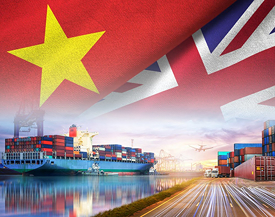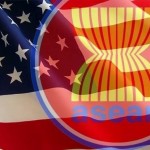Total number of posts 463.
 Despite difficulties caused by the complicated development of the COVID-19 pandemic, trade relations between Vietnam and the UK still achieved good growth during the first year of the implementation of the free trade agreement between the two countries (UKVFTA).
Despite difficulties caused by the complicated development of the COVID-19 pandemic, trade relations between Vietnam and the UK still achieved good growth during the first year of the implementation of the free trade agreement between the two countries (UKVFTA).
Positive growth
Wood exports grew very well in 2021, despite prolonged social distancing with wood exports to the UK market expanding over 20%.
Thanks to the UKVFTA, many wood and wood products will have tax rates reduced to 0% within five years (raw wood currently has a tax rate of 2-10%). “Vietnamese furniture exported to the UK is competitive thanks to its low cost, good raw materials and high product quality,” according to Vietnamese Commercial Counselor in the UK Nguyen Canh Cuong.
He added that some large enterprises in the UK wood industry already have production facilities in Vietnam or have signed long-term cooperation contracts with Vietnamese manufacturers, making it convenient to take advantage of the UKVFTA.
Furniture, along with many other products and goods, has made good use of UKVFTA to penetrate the UK market. According to the Ministry of Industry and Trade, the UKVFTA, effective from January 1, 2021, is expected to be a strong lever for promoting bilateral trade and investment exchanges between the two countries.
However, the complicated developments of the pandemic have caused inevitable consequences in terms of human resources, disruptions to the import-export supply chain and other commercial activities globally, as well as in Vietnam and the UK.
Despite starting in such a difficult context, two-way trade revenue in 2021 still grew by over 17% compared to 2020, reaching 6.6 billion USD, helping bilateral trade revenue return to 2019 levels. In which, Vietnam's exports to the UK increased by over 16%, while the UK's exports to Vietnam increased by 24%.
Besides, the UKVFTA has also opened the door for UK investors to Vietnam. There were 48 direct investment projects from the UK licensed in Vietnam, with newly registered capital of more than 53 million USD in 2021, an increase of 157% over the previous year, which helped maintain the UK’s direct investment in Vietnam at 4 billion USD. The UK is currently in the group of 12 countries with the largest direct investment capital in Vietnam.
Deputy Minister of Industry and Trade Tran Quoc Khanh affirmed that “The UKVFTA agreement is a two-way highway that helps promote the bilateral relationship in a more balanced direction.”
Director of the Multilateral Trade Policy Department (Ministry of Industry and Trade) Luong Hoang Thai assessed that the UKVFTA is one of the factors supporting the economies of both countries when facing challenges caused by the pandemic. 2021 was the first year both countries reduced taxes for each other, with its impact not being significant but positive results were seen.
Director of the WTO Integration Centre under the Vietnam Chamber of Commerce and Industry (VCCI) Nguyen Thi Thu Trang said that, although Vietnam’s export turnover to the UK is still modest, this outcome would not have been achieved without UKVFTA.
Many Vietnamese products with strengths such as furniture, textiles, phones and components, have increased their presence in the UK market. In particular, for agricultural products, the first tonnes of Son La longan were shipped to the UK market, gradually affirming the quality of Vietnamese agricultural products, in one of the most demanding markets throughout the world.
More efforts are needed to utilise the market
Vietnam and the UK are two complementary markets, with almost no products competing directly. Vietnam has many products with advantages in export to the UK, such as textile materials, garments, leather, shoes, and pharmaceuticals. Meanwhile, the UK also has strengths in the fields of pharmaceuticals, raw materials, computer components and others.
Thanks to UKVFTA's incentives, investment opportunities for UK businesses are huge in various areas including education and renewable energy.
Chairman of the British Chamber of Commerce in Vietnam (Britcham) Christopher Jeffery said that British businesses are very interested in the Vietnamese market. “Just looking at the growth in UK investment, we will see the interest of our businesses over time, even in times of pandemic,” Jeffery noted.
However, many industries have yet to gain results as expected, while Vietnamese businesses still need to renew themselves to be able to meet the strict requirements from the UK.
Nguyen Thi Thu Trang said that the first thing businesses expect from authorised agencies is information on commitments, as well as the way to implement them in addition to export quotas and the mechanism to grant quotas to make better use of UKVFTA.
The representative from VCCI emphasised that a signed agreement does not mean that we will automatically penetrate a market or have customers, but we should make long-term efforts to learn about market information, customers’ needs, as well as other regulations to comply with. In addition, management agencies need to create mechanisms, reform administrative procedures, and create the most favourable conditions for businesses.
Source: Nhan Dan Online














